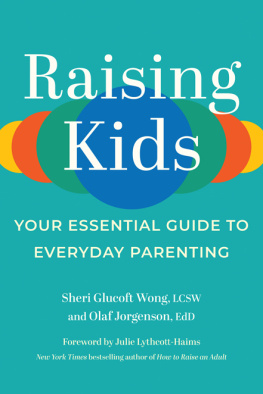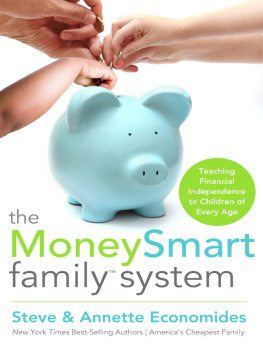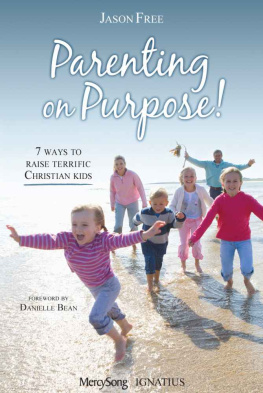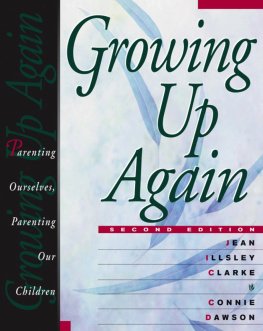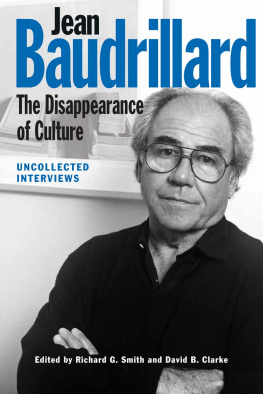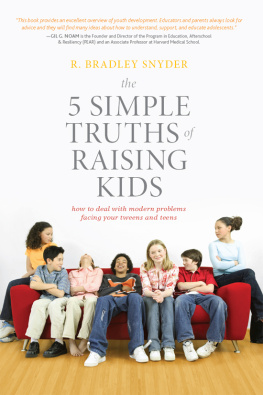PRAISE FOR
HOW MUCH IS TOO MUCH?
This is a marvelously helpful book for those of us who want the very best for our children, but end up loving them in ways that are harmful to their growth and development. Youll find how to discover if you are overindulging your children and positive ways to resist harming by giving them too much too soon, too much power, too many things, with too few rules.
REVEREND DICK LUNDY
How Much Is Too Much? is a timely book for all Americans to read and reflect on. In many ways we are the most overindulgent culture in the world, and this book provides a well-researched, groundbreaking approach to understanding the impact of overindulgence on our children, on our communities, and on our planet. The authors have provided a no-guilt/no-blame strategy for raising our children in a more balanced and loving way. Highly recommended!
RICK INGRASCI, MD, MPH, Director of Community Development, BigMindMedia
By applying what you will learn from How Much Is Too Much?, you will give your child the skills to be successful in life, free your child from the burdens that unintentional overindulgence adds to their already challenging growing-up years, and answer many of the questions youve had about your own bouts with unhappiness.
JOAN K. COMEAU, PhD, CFCS, CFLE, Founder and Director, Family Information Services
What a wonderful and straightforward gift the authors have given our family with this book. Over the past few months, by applying the simple and thought-provoking tools outlined throughout the text, our family has progressed from our two little girls (ages three and five) running things to them being an important part of a well-centered family and understanding choices and consequences. They are much happier and so are we.
KELLY H. DONALDSON, corporate executive and recovering overindulgent father, Lake Independence, Minnesota

Copyright 2004, 2014 by Jean Illsley Clarke, Connie Dawson, and David Bredehoft
This is a revised edition of How Much is Enough? published in 2004 by Marlowe & Company
The Nurture and Structure Charts and the highway illustration originally appeared in Growing Up Again, Parenting Ourselves, Parenting Our Children, by Clarke and Dawson (1998).
All rights reserved. No part of this publication may be reproduced, stored in a retrieval system, or transmitted, in any form or by any means, electronic, mechanical, photocopying, recording, or otherwise, without the prior written permission of the publisher. For information, address Da Capo Press, 44 Farnsworth Street, 3rd Floor, Boston, Massachusetts 02210.
Set in 10.75 point Sabon Lt Std by the Perseus Books Group
Cataloging-in-Publication data for this book is available from the Library of Congress.
ISBN: 978-0-7382-1682-9 (e-book)
Published by Da Capo Press
A Member of the Perseus Books Group
www.dacapopress.com
Note: The information in this book is true and complete to the best of our knowledge. This book is intended only as an informative guide for those wishing to know more about health issues. In no way is this book intended to replace, countermand, or conflict with the advice given to you by your own physician. The ultimate decision concerning care should be made between you and your doctor. We strongly recommend you follow his or her advice. Information in this book is general and is offered with no guarantees on the part of the authors or Da Capo Press. The authors and publisher disclaim all liability in connection with the use of this book. The names and identifying details of people associated with events described in this book have been changed. Any similarity to actual persons is coincidental.
Da Capo Press books are available at special discounts for bulk purchases in the U.S. by corporations, institutions, and other organizations. For more information, please contact the Special Markets Department at the Perseus Books Group, 2300 Chestnut Street, Suite 200, Philadelphia, PA, 19103, or call (800) 810-4145, ext. 5000, or e-mail .
10 9 8 7 6 5 4 3 2 1
To Athalie Terry, who dwells in the
Land of Above and Beyond
CONTENTS
Dear Readers:
This is what we have learned about overindulgence:
Its all around us. Its the New Normal.
It comes from a good heart.
It causes much more pain than we ever imagined.
Overindulgence is not just about money. It can happen at any income level.
Its not just about dysfunctional families. It can happen in any family.
Its not just about being an only child or the youngest child. It can happen to any child.
Its not just about too much stuff or too many privileges. Its also about too much attention and wobbly rules.
It isnt just parents and grandparents. Anyone can overindulge.
Overindulgence isnt harmless. It sets children up for discomfort and failures in their adult lives and can make parenting their own children a very bumpy road.
Overindulgence is unintentional. No parent gets up in the morning and says, I think Ill harm my children by overindulging them today.
Overindulgence can be identified and changed.
Children and adults who have been overindulged can recover.
How do we know these things? We have done ten research studies on overindulgence, and this book is about what we learned. You can .
Now our job is to examine this new information in reference to our own families. We can celebrate what we are doing well and change any practices that need to be improved. We can screw up our resolve to resist the many outside pressures that encourage us to overindulge our children and ourselves.
Join us on this exciting journey.
Jean, Connie, and David
W HY ARE WE SO PASSIONATE about spreading the word about overindulgence? We didnt start out with this sense of urgency. Three authors, three interests, three desires. In the beginning all three of us recognized that overindulgence was becoming more and more noticeable, and so we all felt it was important to study its significance and impact.
David Bredehoft, the head of the research team, had an academic approach. He wanted to increase recognition of overindulgence as a potential problem and use research data to help people recognize and deal with its elusive dynamic.
Connie Dawson saw negative manifestations of it in her therapy practice, but she was equally concerned about the big picture, about its influence on policy decisions and on a cultural drift toward lack of accountability, self-centeredness, and greed.
Jean Illsley Clarke, parent educator, kept her focus on children and how overindulgence was affecting them and their families. She asked: What are the outcomes? Who is doing it, and why?
Originally, all three of us were committed to the project but in a low-key way. But as we have become increasingly concerned about the worrisome outcomes and have identified evidence that overindulgence has become the cultural New Normal, we have all become passionately invested in sharing what we know. On the family level we found that overindulgence is harmful but that it does not come from cruelty or lack of caring; rather, it comes from a good heartgood-hearted giving with unexpected outcomes. Few would disagree that abuse, neglect, and abandonment are hard on the human animal, but many of us do not recognize that overindulgence is one step away from being all of those things. We also see it on an institutional level when schools, courts, and the agents of governments charged with holding a security line seem to have trouble knowing how to draw that line or how to enforce it.
Next page

